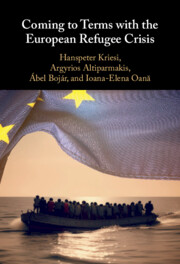Coming to Terms with the European Refugee Crisis
The refugee crisis that hit the European Union (EU) and its member states during 2015–16 was just one in a series of crises over recent decades, but perhaps the most critical for the EU’s resilience. This book shows how policymakers in the EU polity have tried to come to terms with the crisis. To explain how they reacted to the crisis domestically and jointly at the EU level, the study relies on an original method to analyze political processes. It argues that the policy-specific institutional context and the specific crisis situation, defined in terms of asymmetrical problem pressure and political pressure, to a large extent shaped the crisis response. The authors suggest that the way in which the refugee crisis was managed has resulted in conflicts between member states, which have been further exacerbated in subsequent crises and will continue to haunt the EU in times to come.
Hanspeter Kriesi is a part-time professor of comparative politics at the European University Institute, Florence, where he previously held the Stein-Rokkan Chair. Together with colleagues from the London School of Economics and Political Science and the University of Milan, he is currently working on the SOLID ERC Synergy project on the impact of the recent multiple crises on the resilience of the EU.
Argyrios Altiparmakis is a research fellow at the European University Institute and is currently working on the SOLID ERC Synergy project.
Ábel Bojár is the Research Director of 21 Research Center, a Budapest-based political research organization and opinion polling company. He was previously a member of the SOLID ERC Synergy project.
Ioana-Elena Oanӑ is a research fellow at the European University Institute and is currently working on the SOLID ERC Synergy project.

